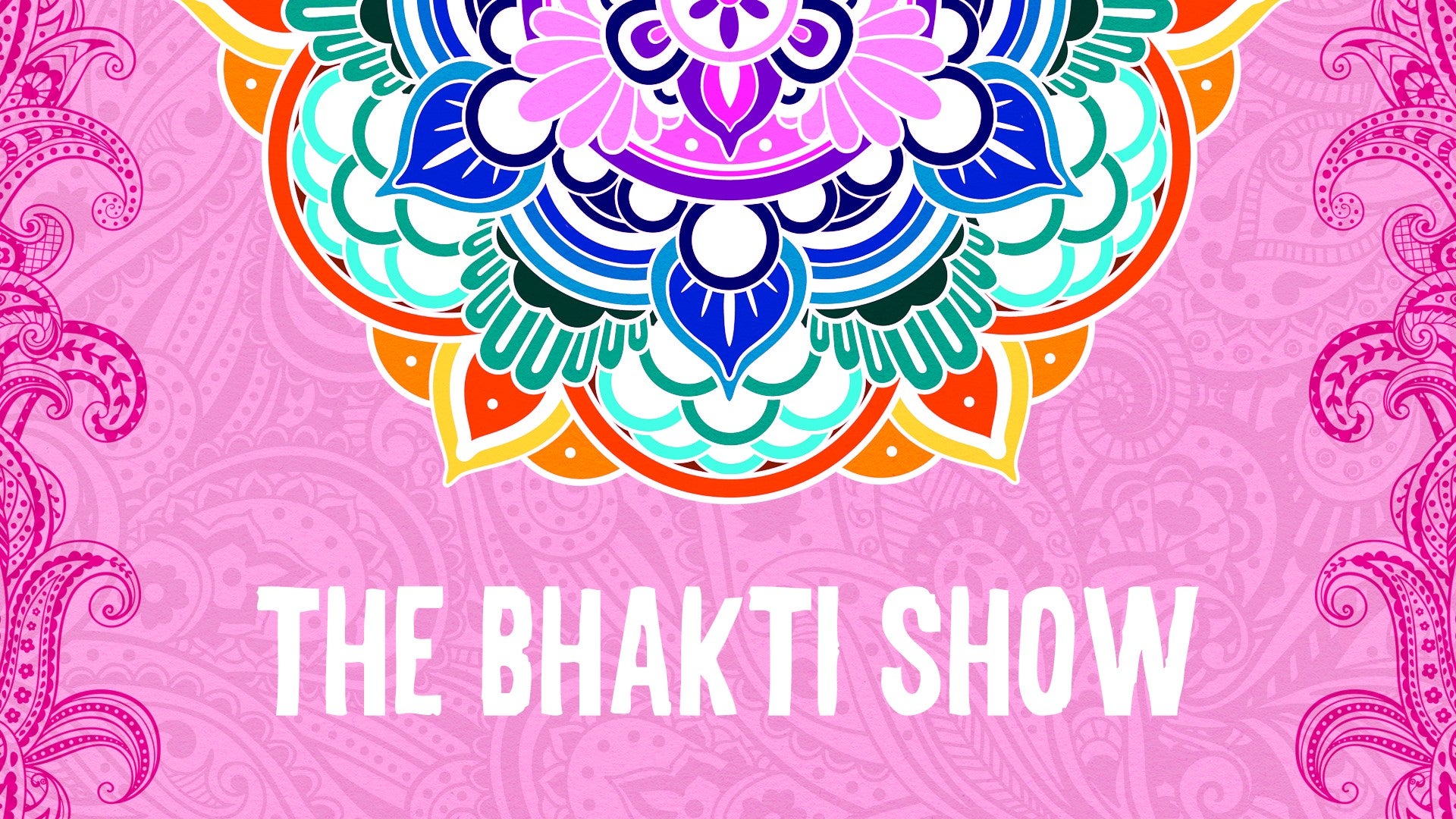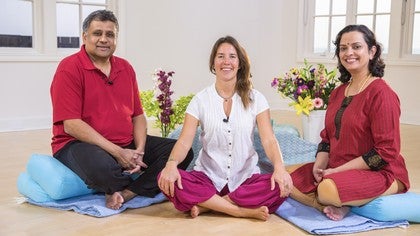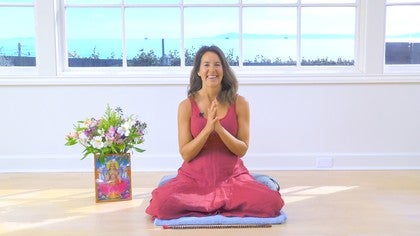Description
About This Video
Transcript
Read Full Transcript
Namaste, dear yogi friend. Namaste, Jyoti. Namaste. So happy to be here today with Jyoti Chalam. She originates from Kerala and Tamil Nadu, southern India. And from what I know, you have grown up in a very devotional, traditional Indian family.
That's correct. Singing from a very early age, the sacred songs and performing puja. So really living in this direct experience of Bhakti yoga. That's correct. And I'm so happy that you're going to share some of your songs with us in the next couple of episodes.
Yes, I would love to. Yay. And excited for your current musical journey where you're doing some music with DJ Drez. That's correct. That's pretty fun. I look forward to hearing that. So Jyoti, really, as you might be able to see already, has this beautiful open heart and smile, and more recently has been drawn to the teachings of Vedanta, the philosophy of self-realization.
So this can sometimes be seen as more of an intellectual path towards the realization of the self, and yet really it's just another tool for dropping us into the heart. That's exactly right. And it feels very important on this path of Bhakti yoga to bring the wisdom of the intellect into it. So I'm so grateful that you're here today to help us with that. I will try.
So perhaps you could just begin by telling us what is Vedanta. Okay, I'll do that. Just before I start, I would like to say, Sri Ganesha Ayanamaha, Sri Guru Bhiyanamaha. So before we start anything, it's a good idea to get the blessings of the elephant-headed God, Ganesha, so that there won't be any obstacles, also to get your blessings, blessings of your guru, so that whatever you may speak will come from that place, from a place which is pure, the idea is to not mislead anybody, right? So you need to have understood this correctly and then impart it correctly, so everybody will benefit from it.
So Vedanta literally means the last part of the Vedas, which is basically philosophy. Okay, so the moment you hear the word philosophy, you'd think that it is really difficult to understand because it's, you know, this is the misconception, actually, they think that it is like looking for a black cat in a dark room where it's not there in the first place. So it doesn't have to be like that, actually. The reason is, if you have been on the path practicing bhakti, practicing yoga, and all of these different practices are there, if you've been doing that, then naturally you'll have this desire to know who you really are, okay? And you'd have all these questions like, what am I doing here?
Who am I? Is there really a God? And who is this God, if there's God? And then, what is this world that I am in, that I'm interacting with every day? So all of these questions will arise.
So then, when that happens, you'll be naturally drawn to this, you know, the study of Vedanta, okay? If your desire is strong enough, and you're earnest, and you're honest with yourself, and you really want to know, then naturally you'll be drawn to studying Vedanta, and you'll find all the answers there, okay? So what Vedanta tells you is that everybody is looking for something or the other, we think. But if you analyze it, everyone is really looking for happiness, all right? And we're searching for it, and we seem to get it momentarily or temporarily, and then we're seeking it again.
So the fact that we're seeking means that we haven't found it yet, right? Isn't that what it means? So then, I thought that maybe we could do a little inquiry. Vedanta is done in the form of an inquiry. It's called Vedanta vichara.
So you inquire into it, and then you arrive at the solution, you know? So we can probably do one of those right now, a little inquiry into where this happiness really is. Yeah. Can we do that? I would love that.
Okay, so let's say I have a glass box here with a million dollars in it, and then let's say there are 10 people sitting here, and we all look at that box. Will it make us happy? Just by looking at the box of cash? No, it's not going to bring you any joy. But let's say there's a fireplace next to it, and then it's on.
It's a cold day. Will everybody be able to feel the warmth? Yes, equally, right? Everybody will be able to feel the warmth. But then you look at the box of money, and you don't feel happy.
Let's say I announce a raffle or something like that, and then I say, if I ask 10 questions, who gets all the answers correct? We'll get to have this box of million dollars. And let's say one of them wins it, or let's say you win it. Would you be happy? Yes.
It'll make you very happy, right? For a moment. Yes, yes. And then you would take it home. You try to open it, and then you figure out that this is an indestructible box.
You can't get to the cash. Will that make you happy? No. You won't be happy. You're very sad.
Then somehow you invent a tool, let's say, and then you break it open, and somehow get the money out. Would you be happy? Yes. Yes. And then, so this goes on and on.
So you're happy, then you're not happy, you're happy, you're not happy. So the money does make you happy. It seems to make you happy, but then not happy, right? Let's say you take that and you buy your dream car. Will you be happy?
Of course you'll be happy, and you bring it home. 10 years later, will that car still make you happy? No. Absolutely not. So what is happening here is that we do experience happiness.
We can't deny that. It is an experience. We can't deny that. It is a direct experience. We can't deny that. But where is it coming from?
It can't be that object. Why? Because it's not able to make you happy exactly like that. Heat is able to make you feel the heat. You're not able to feel the happiness coming from this box of cash, right?
So the happiness cannot belong to that box of cash. It cannot belong to the car either, because the car that you really wanted is now a burden to you after 10 years. You just can't wait to get rid of it, right? So where is this happiness coming from? If you think about that, none of the objects in the world has happiness as its innate nature, okay?
But you can't deny the fact that you're experiencing this pleasure. Where is it coming from? Inside. Exactly. It's coming from inside.
So what Vedanta shows you is that you are the embodiment of joy, okay? So what you're looking for is really within you. It isn't, and that's the fact number one. The second one is it is not anywhere else. You can't find it anywhere else.
Only within you, okay? So in Vedanta, my teacher uses this example of a dog. So the dog bites on a dry bone, right? Trying to get something out of it. What happens is after a while, the gum starts to bleed, and it tastes the blood.
And you know what it thinks? It thinks that it comes from the bone. That's what we are doing. The happiness comes from within, but we think that it belongs to an object, and we transfer it to that object. And then it stops making you happy, and then you wonder why.
And then you just, but you're so busy, you go after some other thing, because now you're a little bit older, and you're maybe a little bit more mature, so you're looking for something else. So you're thinking that the happiness will come from another source, you see? So this is what we're doing. But how does that happiness express itself momentarily, or for a short period of time? The reason is your ego resolves into your true nature.
It's just like in deep sleep. In deep sleep, when we are completely asleep, does anybody complain about the sleep state? Like, no, not at all. You're sleepy. Even if you're counting money, you could be close to a million dollars, but if you feel tired, you will just put it aside, and you will go take a nap or just fall asleep, right? Because we look forward to that.
And what happens to this money when you're sleeping? It's not bad. Just doesn't exist, right? The world doesn't exist. Everything just is resolved into that pure consciousness, which is your true nature.
So when you acquire an object of your desire, the seeker and the sought come together, that's when you experience that pleasure. That comes from within you, right? At that moment, your ego is resolved into your true nature. That's why you feel happy. Because the seeking stops for a moment.
Exactly, exactly. The seeking stops, and you're now residing in your own true nature in yourself. And hence, the formless. We experience ourselves as the formlessness. Exactly.
So the formed deity we worship outside, this seems as though it's outside, right? That formed deity is the misunderstood self, really. That's why when you practice bhakti, the love towards the deity is unconditional, right? You just love this deity unconditionally. Why?
Because it's your own nature, which you haven't realized yet. And you're thinking that it is outside of you. That's why you feel joyous and the love is just unconditional. And that is pure bhakti, by the way. If you're practicing bhakti, let's say I'm praying to Ganesha and asking Ganesha for something.
Because let's say I'm taking a course, and I want to get an A in that course, and I'm praying to Ganesha so that I may get that. So now is my love towards Ganesha or towards getting a good score on that paper? Definitely that something of something else, right? So if something else has come in between me and my favorite deity, so then my love is not real. My love for this deity is not real.
It's conditional, correct? So that's why it doesn't work. But in true bhakti, there is no third object. It's just pure love towards that deity. That's why it feels good.
Which is the self. That is the self. There is always just pure love. Misunderstood self outside. And the correctly understood self is your own true nature.
Yeah, so the Vedantic inquiry makes you realize that. So for someone who's interested in what you're speaking about, where would you direct them to go next? Are there a few steps that you can offer them to inquire into this true self? Or is it a bigger journey that will gradually unfold in its own timing? That's a good question.
It's a step-by-step process. So the first thing to do is have chitta shuddhi. For chitta shuddhi, you practice yoga, chanting, meditation, all of those things you can do, chitta shuddhi, which means purifying the mind. The next stage is chitta eka grata, where you gain the ability to concentrate. Because some of these Vedantic texts will be really difficult to understand unless you have the ability to concentrate.
And you need to have this deep desire to know the truth. So basically, all your other seeking would have subsided and maybe even come to an end. And this is the only thing that you're seeking now, to know your true nature. Okay, when you're at that point, you're ready to go and inquire into it. And there are websites.
You can go to a website called pravachanam.com. How would you spell that? P-R-A-V-A-C-H-A-N-A-M, pravachanam.com. That's one website. And another one is Arsha vidya guru kulam, A-R-S-H-A-V-I-D-Y-A.
Guru kulam is G-U-R-U-K-U-L-A-M. So these websites have lots of talks by great Mahatma saints who can clear all your doubts and help you reach that goal. Beautiful. So how has this practice of Vedanta, which I hear that you have really dedicated yourself to and spend from four to eight hours every day studying. Is that right?
That's correct. It's amazing. Thank you. And so how has it changed you from the inside, affected your life? Like what's the practices given you?
Oh, it's completely changed to me totally. I'm not very comfortable talking about myself, but yeah, but I can assure you that whatever it is that you're looking for, you will find. Thank you so much. Thank you. Namaste.
Thank you. Thank you so much for having me here. Yeah. And blessings to you and whatever seeds have been planted today. Blessings on your journey.
Namaste.
The Bhakti Show
Comments
You need to be a subscriber to post a comment.
Please Log In or Create an Account to start your free trial.












